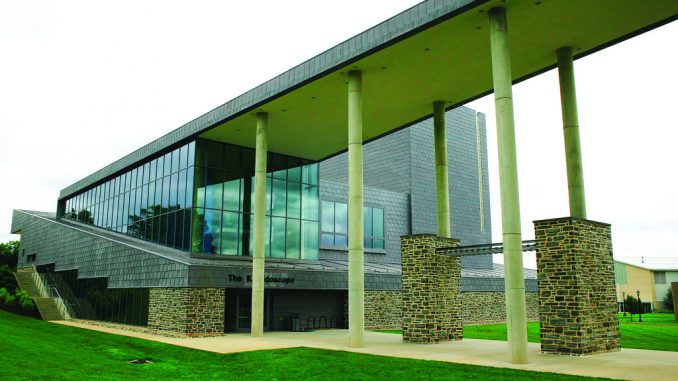
Brooke Hurley (brhurley2@ursinus.edu)
Morgan Mason (momason@ursinus.edu)
September 29th, 2008 was an economically historic day. Not only did the Dow Jones Industrial Average drop 776.68 points in a single day, but the effects on a presidential election impacted industries and families across the nation. The years leading up to this day, between 2000 and 2008, strained working individuals across the country to their core. Lynn Nottage, two-time Pulitzer Prize winner, wrote ‘Sweat’ to highlight socioeconomic tensions in the trade unions at that time.
The play is set at a local bar in Reading, PA. The local bar quickly becomes an oasis for all characters to unwind. After tiring days spent in an industrial plant, the bar is where friends have become family, relationships crumble, and everything in between. ‘Sweat’ highlights how tradition is so deeply rooted in this community’s blood. Though, what matters to each character is slowly revealed as tensions run high and jobs become scarce when NAFTA begins moving industries out of the United States. Union workers begin losing their jobs, gender and racial disparities that existed in Reading begin to put relations to the test.
Nottage’s play is a creative way to represent the race, gender, and socioeconomic challenges in America’s 21st century. Nottage spent two years in Reading, where she immersed herself in the city’s culture to understand the communication, culture, and implicit effects of the economic recession on working adults and their families. Domenick Scudera, director of “Sweat” at Ursinus College, drives home the importance of Nottage’s message. He illuminates her work by stating, “I hope audiences understand Nottage’s message that individuals in communities need to care for each other. The characters in the play are faced with some terrible challenges and, as a result, end up turning on each other because they don’t fully understand the powers at play in their world.”
Scudera, co-founder and former chair of the Theater and Dance department and current theater professor, has directed approximately 40 productions with Ursinus. Scudera’s connection with Nottage adds another layer to his passion for what this play stands for. “Ever since I met her, I have wanted to work on Sweat because I was there when the playwright was creating the work. I believe Lynn Nottage is one of the best playwrights working in American theater today, so I feel especially honored having a connection to one of her plays from the research phase all the way to performance.”
The “SWEAT” performance came to life in the Lenfest Theater in the Kaleidoscope Performing Arts Center March 24th through 27th. The production staff consisted of twenty-four students along with nine members of the ensemble, including two Ursinus staff and faculty members. Michael Thompkins, the Assistant Director of Resident Life, who played the role of Brucie, a father working against the economic recession, as well as Rebecca Roberts, Associate Professor of Biology, playing the role of Tracey, a mother and employee directly impacted by the factory’s lay-offs. Roberts has a passion for theater, and told Ursinus Ed Moorhouse, “I can always keep music and theater in my life, and that’s easier to do than biochemistry in my life. So, I went professional biochemist, but musician and theater person at heart.” Including staff and faculty members in the ensemble brings a unique perspective to stage for both students and other faculty members. “At one time in Ursinus’ history (20 or 30 years ago), faculty and staff were more regularly included in performance projects on our stages. It was exciting that we revived this older Ursinus tradition by including faculty and staff in the company, along with students, for this production of Sweat. It created a unique dynamic,” Scudera noted.
In 2018, Scudera proposed the playwright to be included in the CIE 200 syllabus and has since been analyzed by all students to investigate the four core questions Ursinus poses to all students.
